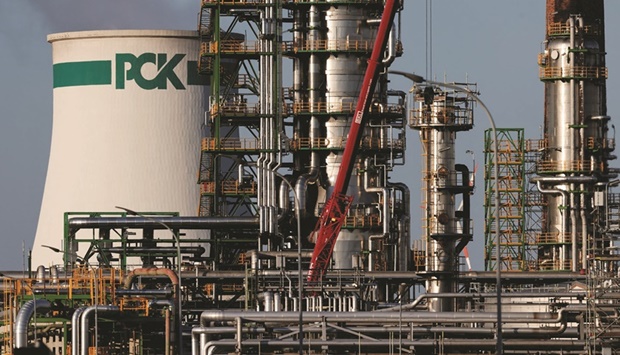Germany’s seizure on Friday of Russian oil assets has been a possibility for months, but the measure kicks off what promises to be a stern test of Berlin’s contingency planning.
Rosneft Deutschland GmbH and RN Refining & Marketing GmbH, which have gone into trusteeship, had been the third biggest oil refiner in Germany, handling about 90 million barrels of crude a year. At least half those barrels were being processed at the Schwedt refinery near Berlin and coming in from Russia’s giant Druzhba pipeline.
Replacing those flows will be the most pressing challenge, but one that Germany was already going to have to undertake because of plans to stop imports from Russia. The plant – along with Leuna to the southwest – has traditionally been reliant on Druzhba.
If the Kremlin’s actions in the gas market are any guide – it shut down the Nord Stream pipeline to Germany as part of its confrontation with Europe over the invasion of Ukraine – then the two refineries may quickly need tap the international oil market for crude. PCK, which runs Schwedt, said Friday it was braced for Russia to curb flows in retaliation.
There are two pipelines that would allow for seaborne cargoes to get to the Schwedt and Leuna: one via the Polish port of Gdansk and another from Rostock on Germany’s Baltic Sea coast.
By the time Poland’s own refineries have taken what they need, there would a shortfall of about 180,000 barrels a day for Schwedt and Leuna, according to data compiled by Bloomberg. The line from Rostock doesn’t have capacity to cover the gap, but Germany also has an extensive network of trucks, trains and barges that can move oil and fuels around.
Tanker tracking also shows that there’s been an increase in cargo deliveries to Rostock in recent months, potentially giving the refineries a buffer if Russia were to immediately cut off Druzhba. About ten tankers have already been brought in this year, Michael Kellner, a deputy economy minister, told local media earlier.
That tallies roughly with tracking that shows shipments reached 1.8mn barrels in August, the highest since the May 2019 when Druzhba had to halt because of contaminants – organic chlorides – in flows. Cargoes arrived from the US, North Sea, Kazakhstan and Libya.
The Rostock to Schwedt pipeline can meet about half the refinery’s crude needs, according to Germany’s economy ministry. The refinery is able to process those barrels, spokeswoman Annika Einhorn said on Friday at a regular news conference in Berlin. That said, the refinery won’t be able to function at full capacity.
The Gdansk option would require Poland’s support. Germany’s neighbour had ruled out co-operation with PCK as long as Rosneft held a majority stake in the refinery.
The trusteeship option chosen by Germany wasn’t what Poland asked for because it means Rosneft is still a shareholder, and the takeover is also only until March 15, 2023. A source in the German government had earlier said that there were many legal issues with a complete expropriation.
As well as a 54% stake in PCK, Rosneft also held 24% of the Miro oil refinery in southwest Germany and 29% of the Vohburg plant in the southeast, according to the Russian company’s website.

Industrial facilities of the PCK oil refinery are pictured in Schwedt/Oder, Germany. The country’s seizure on Friday of Russian oil assets has been a possibility for months, but the measure kicks off what promises to be a stern test of Berlin’s contingency planning.
